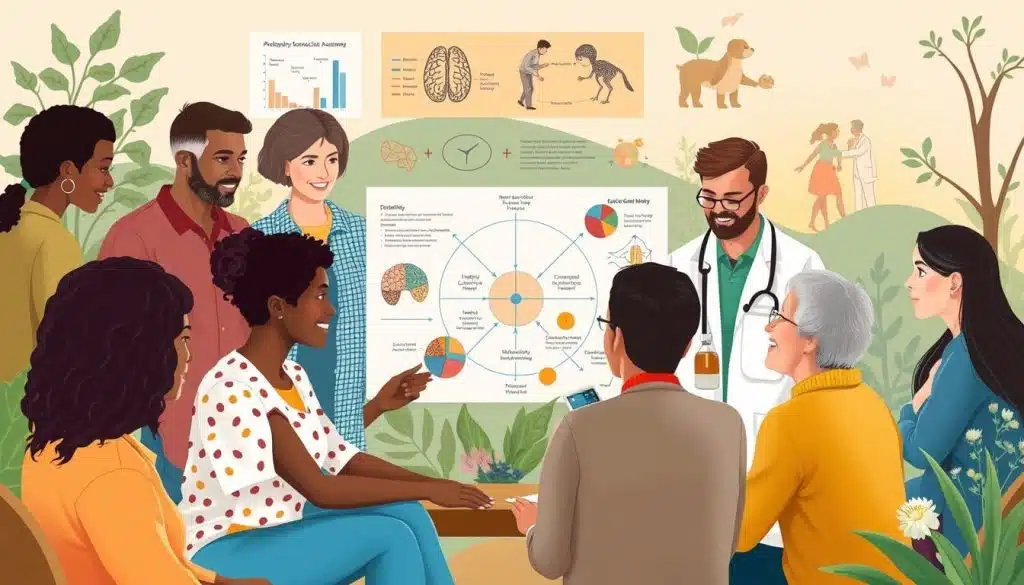Social work helps people, families, and communities meet their needs and thrive. It uses specific methods to improve well-being and address complex issues. Social workers play a key role by conducting assessments by using various skills and tools.
These assessments are vital. They set the stage for all other steps in social work by helping to identify needs and find the right services.
In social work, clinical assessment is a detailed process. It helps professionals understand a client’s mental, emotional, and social health. This step involves collecting and analyzing a lot of information. It’s used to decide the best care and strategies for the client.
Knowing the client’s personal and health history is key. This includes their family background, life events, and health history. This information helps social workers understand the client’s current situation and needs.
Social workers also check the client’s current mental, emotional, and social state. They use diagnostic tools and techniques like interviews and observations. These help find the client’s strengths and challenges.
Many tools and techniques are used in clinical assessment. This includes psychological tests and interviews. These methods give a full picture of the client’s wellbeing. They help decide the best course of action.
| Assessment Method | Description |
|---|---|
| Observation | Closely monitoring the client’s behaviors, interactions, and emotional responses in various settings. |
| Psychological Tests | Standardized assessments that measure personality traits, cognitive abilities, and social skills. |
| Neurological Tests | Evaluations that assess brain function and potential neurological or cognitive impairments. |
| Clinical Interview | A structured or semi-structured conversation to gather in-depth information about the client’s history, thoughts, and experiences. |

“Clinical assessment is a critical step in understanding the client’s unique needs and developing an effective intervention plan.”
Clinical assessment in social work is more than just collecting data. It’s crucial to analyze and interpret this information to create effective plans for clients. Social workers must think critically to spot patterns and key issues. They also need to consider the client’s culture for accurate understanding.
After gathering data, social workers create a hypothesis about the client’s situation. This hypothesis helps them understand the client’s challenges and plan interventions. By looking at both data and the client’s stories, they get a full picture of the client’s life.
With a hypothesis in hand, social workers start making a detailed plan. This plan might include direct services, referrals, or a mix of strategies. Working with the client’s support team is key. This way, they can tackle the client’s challenges and help them reach their goals.
| Research Method | Percentage of Use in Social Work |
|---|---|
| Quantitative Studies | 60% |
| Surveys | 75% |
| Mixed Methods | 45% |
| Randomized Controlled Trials | 25% |
| Descriptive Studies | 65% |
| Single-System Designs | 40% |

“A comprehensive assessment is the foundation for effective social work practice. By analyzing and interpreting the data collected, we can develop a tailored intervention plan that truly addresses the client’s unique needs and circumstances.”
Social workers play a key role in client care. They conduct various clinical assessments to understand clients’ needs and strengths. This helps them create specific plans to help their clients.
These assessments are used in many places like hospitals, schools, and community centers. They help address issues like mental health, substance abuse, and learning disabilities.
In the field of social work, conducting a thorough client assessment is fundamental to understanding the complexities of an individual’s life and creating an effective intervention plan. An example of client assessment in social work typically begins with gathering essential demographic information, such as the client’s age, gender, and socio-economic status, as well as understanding their cultural background and any relevant history that may influence their current situation. This initial phase sets the groundwork for a comprehensive understanding of the client’s life, identifying strengths and challenges that may be crucial in the following steps of the assessment.
In the field of social work, comprehensive understanding of clients’ situations is essential for effective intervention, which is why the biopsychosocial and psychosocial assessments play a critical role. The psychosocial assessment in social work enables practitioners to gather detailed insights into the client’s life, including their social environment, mental health status, and biological factors. This holistic approach ensures that social workers can identify the various factors influencing a client’s wellbeing, allowing for more tailored and effective support. By considering biological, psychological, and social dimensions, social workers can better navigate complex cases and promote positive outcomes.
The biopsychosocial assessment template social work pdf serves as a vital tool for social workers. This structured framework not only guides professionals in consistently capturing essential information but also facilitates ongoing reflection and assessment throughout the intervention process. By employing a standardized template, social workers can ensure that no critical aspects of the client’s life are overlooked, from medical history to familial relationships and current stressors. Such thorough documentation enhances communication among team members and provides measurable data that can inform future case plans.
In the field of social work, the biopsychosocial model serves as a comprehensive approach to understanding a client’s experiences and challenges. An example of biopsychosocial assessment in social work can be seen in cases involving individuals undergoing mental health treatment. A social worker may begin by evaluating biological factors such as overall physical health, medication compliance, or family history of mental illness. This biological assessment is complemented by an exploration of psychological elements, including emotional wellbeing, cognitive functioning, and coping strategies that the client employs. Finally, the social aspect is addressed, focusing on the individual’s relationships, community connections, and socio-economic status, all of which influence their mental health condition.
In one scenario, a social worker might utilize a structured social work needs assessment template to gather comprehensive information. For instance, a social worker assessing a single parent facing unemployment might first explore genetic predispositions to anxiety or depression. Subsequently, the assessment would dive into the client’s psychological state, considering stress levels and the impact that these have on the individual’s parenting ability and overall mental health. Lastly, the social worker would investigate the client’s external environment, assessing the resources available within their community, support systems, and any potential barriers they might face, such as a lack of childcare or transportation.
A social worker needs assessment is an essential process in the field of social work, serving as a foundation for understanding the unique challenges and strengths of individuals or communities. This comprehensive evaluation is designed to gather a wide array of information regarding a client’s circumstances, including their emotional, social, and environmental factors. By engaging in this multifaceted assessment, social workers can develop tailored intervention strategies that address the specific needs identified during the evaluation. The goal of this assessment is not only to identify gaps in service delivery but also to empower clients by recognizing their strengths and resilience.
SOAP assessment is an integral component of social work practice, designed to systematically evaluate a client’s needs and inform appropriate interventions. The acronym SOAP stands for Subjective, Objective, Assessment, and Plan. This structured approach allows social workers to gather comprehensive information, ensuring that all aspects of the client’s situation are considered. In many cases, a SOAP assessment in social work includes a thorough exploration of the client’s feelings, perceptions, and the impact of their environment. This holistic view enables professionals to develop a more targeted intervention strategy.
An effective SOAP assessment social work process often begins with the Subjective section, where social workers document the client’s self-reported concerns and experiences. This part is crucial as it captures the client’s perspective, providing insight into their motivations and emotional state. Following this, the Objective portion involves gathering observable data, such as behavioral patterns and any relevant medical history. Together, these elements form a well-rounded understanding of the client, akin to a biopsychosocial assessment social work example, which incorporates biological, psychological, and social factors impacting the individual’s well-being.
Clinical assessments are key in social work. They help understand a client’s needs and create effective plans. By doing thorough assessments, social workers can help people, families, and communities grow and face challenges.